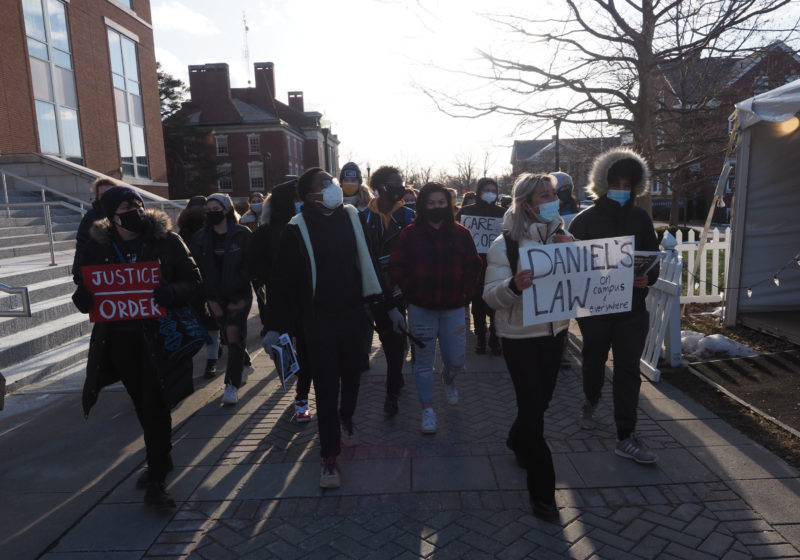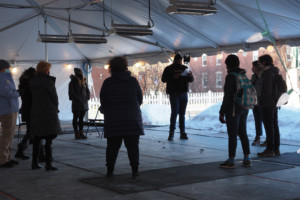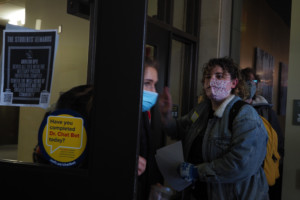On Thursday, the UR Abolition Coalition (URAC) staged a protest at the in-person Casual Conversations with President Mangelsdorf event.
During the event, students repeated their demands for changes to the Department of Public Safety (DPS) to Mangelsdorf directly.
This move follows last semester’s overnight occupation of the DPS parking lot where URAC protestors voiced their demands to University President Sarah Manglesdorf and DPS chief Mark Fischer, who promised further discussion.
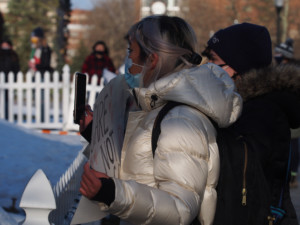
Protestors stand outside the Wilson Quad Tent while Andre Tulloch delivers his speech. Photo by: Henry Litsky
“[President Manglesdorf] had promised us that night […] that she would be starting to actually have progress with this mental health task force to institute Daniel’s [Law] on campus, and ensure that cops […] and campus police do not respond to mental health calls on this campus,” URAC organizer and senior Antoinette Nguyen said. “However, there’s been no update regarding that.”
The protest began at the steps of Rush Rhees Library, where many of their actions have started in the past. At around 4:30 p.m., organizers went over the plans to the group of roughly 30 people around the steps.
They departed the steps at 4:36 p.m. and walked down Eastman Quad chanting, “What do we want? Care, not cops! When do we want it? Now!”
They soon arrived at the Wilson Quad tent where President Mangelsdorf and various sophomores were talking.
Protestors lined the fence around the tent while URAC demonstrator and sophomore Andre Tulloch read a prepared speech to the President.
“You and your administration behave as though you actually support radical change for the University, but all you have for us is empty promises and fruitless committees,” Tulloch told the President. “We, the students, are fighting hard to actually see change. Last fall, we slept outside in the cold in front of DPS in order to get the attention of those who say they hear us and want to make the changes. Our meeting with you has been thwarted by bureaucratic red tape time and time again. We demand that if you really care about these issues and the students here, that you prioritize this meeting.”
Tulloch went on to read the URAC’s demands before the demonstration moved on into Wilson Commons. The large group, which had gained some sophomore supporters, swarmed into Wilson Commons and then Rush Rhees, armed with hundreds of paper flyers that listed The Students’ Demands and included two QR codes for students to read more about the movement.
Sophomore Courtney Jung and first-year Mira Chaskes, who were in the library during that time, were “taken aback” and “caught off guard” when they saw the large group enter the library, but appreciated their conduct.
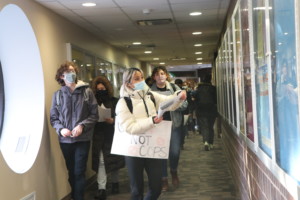
Protestors didn’t only hand out protestors, but also hung many up on walls along the way. Photo by: Haven Worley
“They definitely made their presence known, but without being too disruptive,” Chaskes said.
Jung, who was in the middle of completing a calculus problem on a whiteboard, stopped her work to look into the movement briefly. “I like how they were being respectful and knowing it’s a library,” Jung said. “They wanted to prove their message in a way that is not benign, but more subtle, so you feel more accepting [of] their message.”
URAC organizers expressed optimism after the protest and stressed the importance of pressuring the administration.
“It’s important that we made her feel uncomfortable and not only her, but everybody that’s in her circle, because that feeling of being uncomfortable is something that is kind of rare on this campus, especially for admin,” URAC member and junior Katie Hardin said. “Bringing it to her instead of letting her hold all the cards in this situation […] was one of the best things we could have done.”
“They did feel physically unsafe but that is something they can feel. That’s how students feel on this campus with DPS,” URAC member and junior Indy Marring said.
URAC plans to hold another virtual town hall sometime in the future, although the date is unknown at the time of this article’s publication. Though the future of their demands is uncertain, what remains certain is that URAC is here to stay.
“I believe the president saw us and heard us. Whether or not she was listening, I don’t know. I didn’t feel like it,” Marring said. “But she definitely saw and heard us. And we will meet with her later this month to see if she’s listening.”
To follow for more updates, make sure to check out URAC’s Instagram here.
Haven Worley contributed to the reporting for this article.
